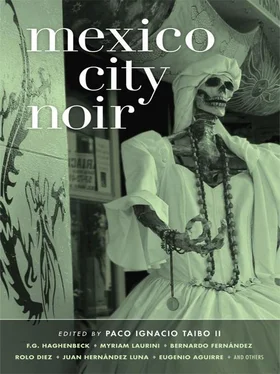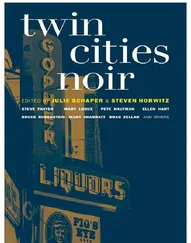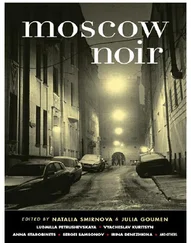“This is the true sexual liberation,” whispered a voice in her ear.
Instinctively, she reached for her gun, a useless reflex; she’d been unarmed since she’d changed her sex.
“I am Father Próspero. I have seen you dancing on tables. You’re never entirely naked. How did you get that privilege? When you finish your performance, they shout at you and humiliate you-do you like being humiliated?”
A street sweeper crept by.
When Nausícaa heard the word humiliation , it struck her like one of those badly pirated DVDs, and the images came to her, one after another, of her debasement at the hands of her fellow officers, the resentment they felt at her middle-class ways. Maybe they would have had more respect if she’d behaved like a whore from Veracruz and let them call her Negra . The DVD paused on an image from adolescence, when his father caught him fucking the maid’s son. He ran to the woman who’d raised him, but he was sent off to become a cop, to get the puto out of him. It didn’t work; his peers did whatever they wanted with him until Commander Pérez, his guardian angel, showed up. That night Commander Pérez paced, unable to read The Odyssey : They had consumed Nausícaa and the slaves. No sooner had they gotten rid of her veils and played, then there was Nausícaa, with her snow-white arms, singing . His protector, his guardian angel…
Her stomach began to turn, or maybe a psalm came to her, and she confessed to Próspero the incident with the servant’s son, and how he had massaged the private parts of those who had been tortured. The priest smiled, and her mouth went dry.
“What are you doing here at this hour, Father?” She spoke now in a calm, solemn tone, but there was coldness in her eyes. “Did you come to bring them something to eat?”
“No, I came to eat them.”
“Are you a sinner?” Tears bubbled from the heat of Anáhuac’s merciless night.
“I’m a goliardo, a clerical nomad,” the priest answered. “As they say: To follow gods and goddesses / will be a good sentence / because networks of love / have already captured adolescence .”
A squeak filtered through the night. Then there was more noise, more squeaks from the fornicators over to the side, from the mattresses, from under hospice blankets, from the tents, the makeshift dormitory.
“Hija, this is the fullness of freedom,” the man continued. “No hippie commune produced this. It’s better than the most insolent rap. Any pornographic mosaic from Pompeii pales before this. It can’t be compared to any Parisian watercolor of phalluses and vulvas from the nineteenth century. Your table dance is nothing next to this. These are real swingers. And look where it all takes place, in this very ass-and the city has many-just a few blocks from where liberals from Canada and Finland stroll, every one of them wanting to invent a happiness machine, and whoa! This is the kingdom of primitive Christianity, without any initiation rituals.”
He pulled a tin from his brown habit and inhaled. Nausícaa saw him blush and it dawned on her that she’d never fully glimpsed the face of the other priest, Father Diego Tonatiuh, which was always hidden under the pointed hood.
“Are you coming over for dinner, hija? We live in the same building. I prepared something. Cous cous with a guajillo chili marinade and chili morita, spiced with epazote and yerba santa, fusion cuisine.”
The altar boy with the small brazier appeared, scattering dirt and toluene around the fornicators. The neighborhood’s residents curled up to sleep, hotels cautiously opened their doors. The local dives turned down their music to an intimate proletarian hum. Unaware of having lost a war-only one, and on Mexican land-San Fernando continued on his altar carved by Indians.
Nausícaa wanted to hang herself with San Francisco’s pebbly cord until Father Próspero explained that the altar boy was the pastor of his congregation out in the streets, the one who chose the lambs whose souls would go to Chichihualco, Limbo, Tlalocan, Seville, or wherever.
Commander Pérez completed his part in the death of the queer cannibal. A hate crime, pure homophobia perpetrated by officially sanctioned killers. The guilty were predetermined. A patrol car took the commander home to a garish marble-andaluminum subdivision with swimming pools and a golf club. His wife was sleeping. He gave her a kiss. He went to his children’s bedroom, tucked them in. They’d left him their notebooks, as always, so he could check their homework. He went to his mahogany-walled study, with its diplomas from the Mossad and FBI, each framed by ninja stars. He reviewed the homework; he never let his kids down. He threw himself in an easy chair to watch Law & Order -he had the entire series on DVD-and tried in vain to read The Odyssey , his only book, which he owned in seven different editions. He had never read anything else in his life. Now an hourglass indicated it was time to deflower Nausícaa, of the snow-white arms, with his declaration of love: Who takes you as a wife is the boldest of all. No mortal, neither man nor woman, has ever come before me like this, overwhelmed me like this at mere sight . That very dawn he would tell her; that night they would leave for Cancún. He would buy a table dance and they would fuse orgasmically right there on stage. Oh Nausícaa! If only she’d already returned from the nave.
He left again for San Fernando, this time without escort.
“We are like angels; God made us, but not to marry or reproduce. Unlike the others, we were created individually-he put us in the hands of a surgeon so that each of our parts could be modeled, considered. We are neither cherubs nor seraphim; we don’t marry or reproduce. We are simultaneously impersonal and celestial, but adventurous when it comes to sex. We are expelled from paradise and, because we live in Mexico City, we make rounds with the spirits of Huitzilopochtli, a brotherhood which San Fernando curses and about which he can’t do a thing, even though his spirit comes to us from Seville. We are like the native witch doctors who have the ability to change into other beings, because God is fanatical, hija.”
Father Diego Tonatiuh was hiding in a corner behind the altar, next to the photo of the dead bank robber disappeared by the state police. The decomposed corpse had been discovered unrecognizable in a sewer’s foam. A red battery-powered lamp illuminated the photo, which was signed by Sister Reckless of the Nuncas , nicknamed La Conversa .
The priest walked through the nave to the choir, crossed himself under the cupola with the Immaculate Conception surrounded by angels with violins, lauds, and zithers. In the Expiatory Chapel, he said the Xochicuícatl: “Begin, singer. Play your flowered drum. Delight princes, eagles, and ocelots. It’s only for a brief time that we are on loan to each other.” He went to the inner door in the darkness shot through with lights, undid the bolt, and let the shutters fall on each other. He entered the confession booth and waited as he had on so many nights since he’d first seen Nausícaa in the neighborhood. On loan to each other , the phantom of the nuncas said to himself, immune to the blackness of the kettle in which his resentments were boiling over. The time we’re on loan to each other is so brief . The bank robberies had only been emotional crises, prequels to a loving eternity that had disgusted Commander Pérez when he saw the effeminate lover in a cell in that wretched police station. Father Diego Tonatiuh sucked rancor from the depths of his hatred, let slip the rest in threads of saliva that thickened the broth of his miseries.
Nausícaa entered the furnished apartment building next to San Fernando. The façade had slumped from all the quakes. The waning moon lit the four-story stairway, nahui-four, a tangle of steps, a bridge of silver and obsidian between Seville and Tenochtitlán, Paradise and Mictlán.
Читать дальше












